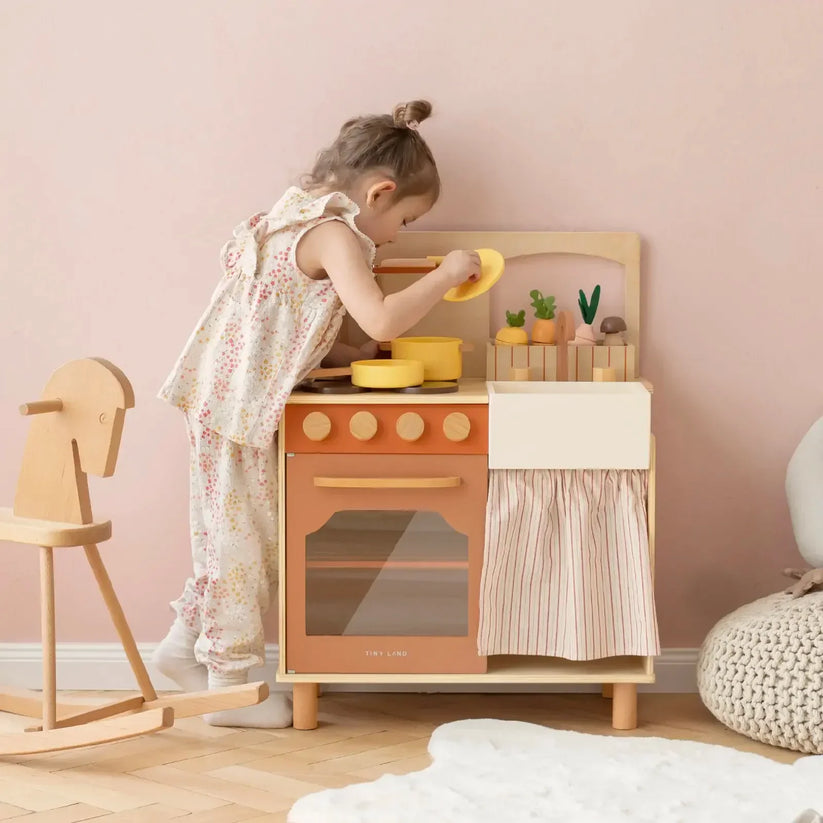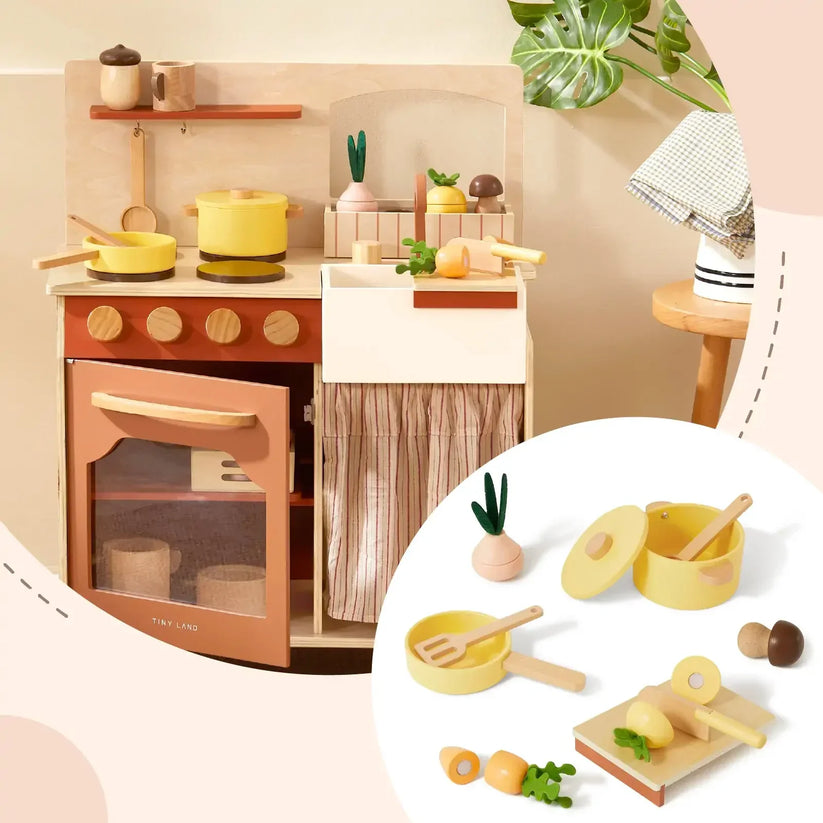You've probably heard of the concept of a play kitchen for your child if you're a parent or other caregiver. Play kitchens are scaled-down recreations of actual kitchens that are stocked with toy appliances, utensils, and food. For kids, they offer a fun and instructive play experience. It can be difficult to pinpoint the ideal age for a play kitchen, though. We will examine the advantages of play kitchens in this post, as well as the best age range for introducing them to your child.
The Appeal of Play Kitchens
Children's play kitchens have long been a well-liked toy option. Kids can play imaginatively and imitate the daily rituals they see at home because they mirror the setting and activities that occur in a real kitchen. Play kitchens provide a variety of interactive and instructive experiences, including pretend cooking, serving tea to toy animals, and organizing play food.

The Benefits of Play Kitchens
Development of Cognitive Skills
Children can practice a variety of cognitive skills in play kitchens. Children learn about object manipulation, cause-and-effect linkages, and problem-solving through pretend play. They perform activities like sorting, counting, and categorizing toy food items, which develops their organizational and mathematical thinking.
Enhancing Social and Emotional Development
Children frequently incorporate their friends, siblings, or parents in their imaginative play when using play kitchens. Cooperative play like this promotes turn-taking, sharing, and social connection. Along with practicing politeness, pretending to prepare meals for others, and expressing their emotions through role-play, it aids children in growing their emotional intelligence and empathy.
Encouraging Language and Communication Skills
Children can develop their language skills and broaden their vocabulary on play kitchen sets. Their communication skills grow as kids participate in conversations, describe their activities, and mimic real-world situations. Children may also tell stories, which allows them to develop their imaginations and storytelling abilities.
Fostering Creativity and Imagination
Children can let their imaginations run wild and explore them via imaginative play with a toy kitchen. They can create new recipes, turn ordinary items into delectable foods, and play chefs, restaurant owners, or even hosts of cooking shows on television. Their capacity for original thought and problem-solving is fostered by this imaginative activity.
Building Problem-Solving Abilities
Children face a variety of difficulties while playing out role-playing scenarios and pretending to cook. They could have to make decisions about how to efficiently organize the cooking space or run out of ingredients. These changes to solve problems foster critical thinking abilities and teach kids to consider various options and come to decisions.
Finding the Right Age for a Play Kitchen
The ideal age range for introducing a play kitchen to your child depends on their developmental stage and abilities. Here are some guidelines for different age groups:
Early Development Stage (12-18 months)
Children are learning basic motor skills and exploring their surroundings at this age. To encourage sensory investigation and hand-eye coordination, play kitchens with straightforward, substantial, and chunky parts might be introduced. Put your attention on items that have buttons to press, doors to open and close, and things that make noise or light up.
Toddler Stage (2-3 years)
Children start emulating actions they see at home when they are toddlers. Their curiosity can be piqued by toy kitchens that have realistic features like working knobs, opening doors, and sinks that simulate water play. By mixing, pouring, and sorting play food, they can develop fundamental pretend play skills.
Preschool Stage (3-5 years)
Preschoolers can participate in more sophisticated play scenarios and have a growing awareness of the world. Their pretend play can be improved with play kitchens that have extra elements like lit cooktop burners, timer-controlled ovens, and interactive sound effects. They can begin including more complex pretend play activities like preparing full dinners and organizing tea parties.
School-Age Children (5+ years)
Even while older kids might outgrow a standard toy kitchen, pretend play including cooking and food preparation can still be beneficial for them. Think of more sophisticated toy kitchen sets or even kid-friendly versions of real kitchen appliances. By creating meals with friends or family, they can hone their cooking abilities and participate in cooperative play.
Factors to Consider when Choosing a Play Kitchen
When selecting a play kitchen for your child, keep the following factors in mind:
Safety and Durability
Make sure the play kitchen complies with safety requirements and is constructed using non-toxic materials. Accidents during play are less likely because to the sturdy design and rounded edges.
Size and Space
Choose a play kitchen that easily fits in your home after taking into account the available space. To make sure it won't overcrowd the space, measure the area where you intend to put it.
Interactive Features and Accessories
For interactive play kitchens, look for features like lighting, noises, and moving parts. Pots, pans, cutlery, and pretend food items can be used as accessories to improve play.
Personal Interests and Preferences
When selecting a play kitchen, take your child's tastes and hobbies into account. Find choices that fit their tastes if they have a favorite color or like a certain theme. The play kitchen can be made more appealing and interesting for your youngster by adding personal touches.
Conclusion
A play kitchen can be a rewarding and instructive experience for your child. Play kitchens have many advantages, such as fostering social connection, language development, creativity, and fine motor skills. You may choose the best play kitchen for your child's age and interests by being aware of the various developmental phases and taking into account elements like safety, size, and interactive features.

Frequently Asked Questions
Can boys play with play kitchens?
Absolutely! Play kitchens are available to people of all genders. Playing with a toy kitchen can help boys just as much as girls when it comes to developing their imagination. With the help of this entertaining and instructive toy, encourage all kids to discover their hobbies and develop new talents.
Are play kitchens only for girls?
No, play kitchens are appropriate for kids of both sexes. Regardless of gender, play kitchens offer worthwhile educational opportunities and foster skill development. It's crucial to promote diversity and let all kids participate in play activities that interest them.
How can I encourage my child to play with a play kitchen?
Lead by example to stimulate your child's interest in a toy kitchen. Show off how to use the various functions while interacting with the kitchen in a playful manner. When they exhibit interest or engage in imaginative play, show them appreciation and positive reinforcement. Further enhancing the play experience is adding pretend food and utensils as well as inviting friends or siblings to join in.
Can a play kitchen help my child develop real cooking skills?
Play kitchens are designed mostly for imaginative play, although they can help children develop future practical cooking skills. Children learn about kitchen routines and fundamental food preparation ideas as they role-play and copy cooking duties. You can encourage kids to participate in age-appropriate cooking activities in a real kitchen as they become older to hone their culinary abilities.
Where can I find the best play kitchen for my child?
High-quality play kitchens can be found in a variety of places. You can look at retailers that focus on selling children's toys online, in department stores, or in toy stores. To select the greatest play kitchen that satisfies your child's requirements and preferences, read reviews, contrast features, and take your budget into account.
In conclusion, kids of all ages can benefit from and enjoy playing with a pretend kitchen. Children can acquire critical cognitive, social, and motor skills by being given a space for imaginative play. Choose a play kitchen that is safe, has interactive elements, and is appropriate for your child's age and interests. Allowing your child to use a toy kitchen can encourage their imagination and support their development as they embark on a culinary adventure.


